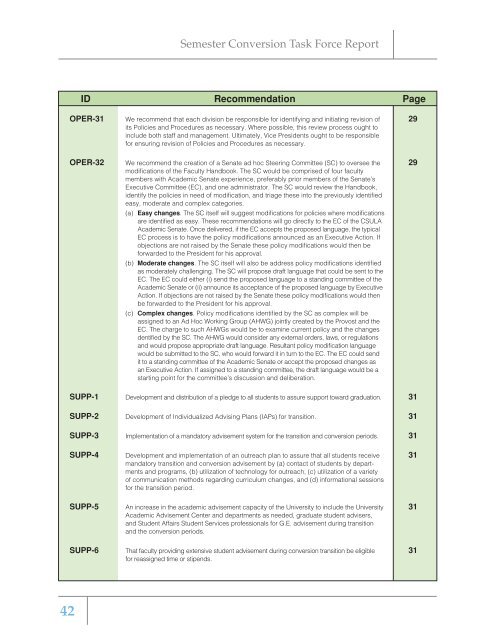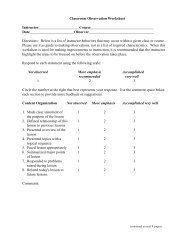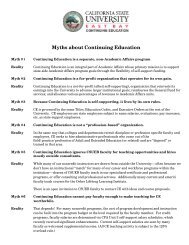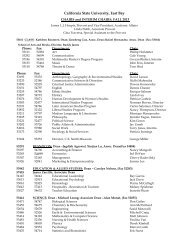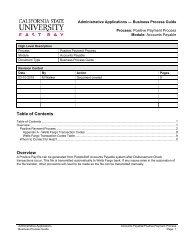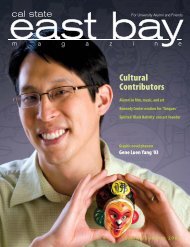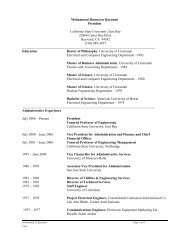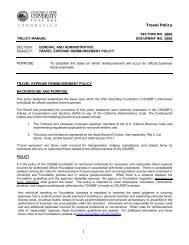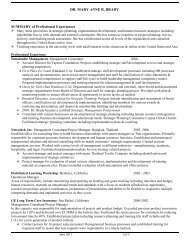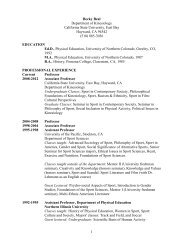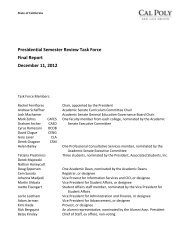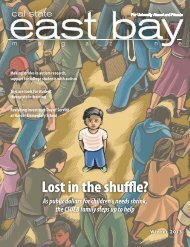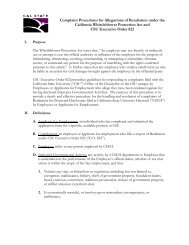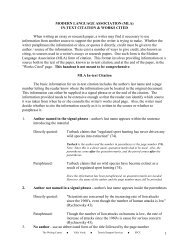Report of the Semester Conversion Task Force - California State ...
Report of the Semester Conversion Task Force - California State ...
Report of the Semester Conversion Task Force - California State ...
- No tags were found...
You also want an ePaper? Increase the reach of your titles
YUMPU automatically turns print PDFs into web optimized ePapers that Google loves.
<strong>Semester</strong> <strong>Conversion</strong> <strong>Task</strong> <strong>Force</strong> <strong>Report</strong>ID Recommendation PageOPER-31 We recommend that each division be responsible for identifying and initiating revision <strong>of</strong> 29its Policies and Procedures as necessary. Where possible, this review process ought toinclude both staff and management. Ultimately, Vice Presidents ought to be responsiblefor ensuring revision <strong>of</strong> Policies and Procedures as necessary.OPER-32 We recommend <strong>the</strong> creation <strong>of</strong> a Senate ad hoc Steering Committee (SC) to oversee <strong>the</strong> 29modifications <strong>of</strong> <strong>the</strong> Faculty Handbook. The SC would be comprised <strong>of</strong> four facultymembers with Academic Senate experience, preferably prior members <strong>of</strong> <strong>the</strong> Senate’sExecutive Committee (EC), and one administrator. The SC would review <strong>the</strong> Handbook,identify <strong>the</strong> policies in need <strong>of</strong> modification, and triage <strong>the</strong>se into <strong>the</strong> previously identifiedeasy, moderate and complex categories.(a) Easy changes. The SC itself will suggest modifications for policies where modificationsare identified as easy. These recommendations will go directly to <strong>the</strong> EC <strong>of</strong> <strong>the</strong> CSULAAcademic Senate. Once delivered, if <strong>the</strong> EC accepts <strong>the</strong> proposed language, <strong>the</strong> typicalEC process is to have <strong>the</strong> policy modifications announced as an Executive Action. Ifobjections are not raised by <strong>the</strong> Senate <strong>the</strong>se policy modifications would <strong>the</strong>n beforwarded to <strong>the</strong> President for his approval.(b) Moderate changes. The SC itself will also be address policy modifications identifiedas moderately challenging. The SC will propose draft language that could be sent to <strong>the</strong>EC. The EC could ei<strong>the</strong>r (i) send <strong>the</strong> proposed language to a standing committee <strong>of</strong> <strong>the</strong>Academic Senate or (ii) announce its acceptance <strong>of</strong> <strong>the</strong> proposed language by ExecutiveAction. If objections are not raised by <strong>the</strong> Senate <strong>the</strong>se policy modifications would <strong>the</strong>nbe forwarded to <strong>the</strong> President for his approval.(c) Complex changes. Policy modifications identified by <strong>the</strong> SC as complex will beassigned to an Ad Hoc Working Group (AHWG) jointly created by <strong>the</strong> Provost and <strong>the</strong>EC. The charge to such AHWGs would be to examine current policy and <strong>the</strong> changesdentified by <strong>the</strong> SC. The AHWG would consider any external orders, laws, or regulationsand would propose appropriate draft language. Resultant policy modification languagewould be submitted to <strong>the</strong> SC, who would forward it in turn to <strong>the</strong> EC. The EC could sendit to a standing committee <strong>of</strong> <strong>the</strong> Academic Senate or accept <strong>the</strong> proposed changes asan Executive Action. If assigned to a standing committee, <strong>the</strong> draft language would be astarting point for <strong>the</strong> committee’s discussion and deliberation.SUPP-1 Development and distribution <strong>of</strong> a pledge to all students to assure support toward graduation. 31SUPP-2 Development <strong>of</strong> Individualized Advising Plans (IAPs) for transition. 31SUPP-3 Implementation <strong>of</strong> a mandatory advisement system for <strong>the</strong> transition and conversion periods. 31SUPP-4 Development and implementation <strong>of</strong> an outreach plan to assure that all students receive 31mandatory transition and conversion advisement by (a) contact <strong>of</strong> students by departmentsand programs, (b) utilization <strong>of</strong> technology for outreach, (c) utilization <strong>of</strong> a variety<strong>of</strong> communication methods regarding curriculum changes, and (d) informational sessionsfor <strong>the</strong> transition period.SUPP-5 An increase in <strong>the</strong> academic advisement capacity <strong>of</strong> <strong>the</strong> University to include <strong>the</strong> University 31Academic Advisement Center and departments as needed, graduate student advisers,and Student Affairs Student Services pr<strong>of</strong>essionals for G.E. advisement during transitionand <strong>the</strong> conversion periods.SUPP-6 That faculty providing extensive student advisement during conversion transition be eligible 31for reassigned time or stipends.42


